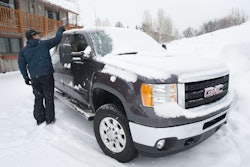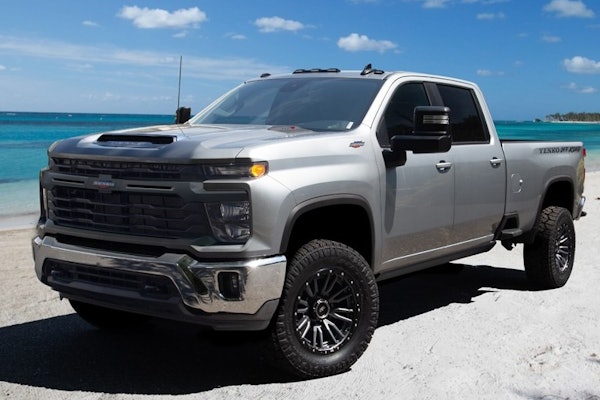 How to Lower Annual Fuel Costs
How to Lower Annual Fuel Costs
By Robin Walton, CPA
Paying our company’s fuel bills has made me acutely aware of the increase in fuel costs in recent years and has got me thinking about how our guys drive and where we can save with changes to our pickups.
Saving money on fuel has always been a concern for anyone with a landscaping or contracting business. The nature of the business involves driving from jobsite to jobsite, so fuel has always been an expense to be reckoned with.
But in these days, as the cost of fuel has sky rocketed, it’s become an even more important cost element to control.
The good news is, you don’t have to go out and buy a more fuel-efficient vehicle to improve your fuel costs. There are some things you can do, starting today, with the pickups you already own.
Keep pedal off of metal
A lot of guys won’t want to hear this, but aggressive driving wastes fuel. Aggressive driving – that is rapid acceleration, late braking and speeding – can lower your fuel mileage up to 33 percent at highway speeds and by 5 percent around town, according to the U.S. Department of Energy.
Though each vehicle reaches its optimum fuel efficiency at its own specific range of speeds, generally when you are going over 60mph, fuel efficiency is going down.
Using cruise control can help keep your speed where you intend it, in a range that helps optimize your fuel efficiency. A side benefit to slowing down, is avoiding a speeding ticket, which can really have an impact on your transportation costs!
Also, don’t leave your pickup idling when you stop by the jobsite. You can burn up a quarter- to a half-gallon of fuel per hour just idling your vehicle, depending on engine size and air conditioner use. You’re better off to just turn off the engine.
Take a load off
Hauling around unnecessary tools and gear in your truck can also be costing you at the fuel pump.
Haul only essential tools and materials in your pickup and consider the impact on fuel economy when you are looking at adding any after market accessories. A lighter tool box or rack system can make a difference in fuel efficiency.
Some roof racks may decrease your fuel economy by up to 5 percent, according to a Consumer Reports test. If it’s an essential for your business, then by all means, keep it. But if your roof rack is used only occasionally, store it at the shop until you need it.
A lot of contractors tow utility trailers daily. The same concept applies for your trailer; take a look and make sure you aren’t carrying around any unnecessary weight.
If you are in the process of buying a trailer, look for an ultra-lite trailer made with aluminum framing – or a box trailer with an aerodynamic front instead of a flat wall.
Wind and air resistance work against you in the fuel efficiency game. If you can increase the aerodynamics of the trailer you are pulling, you can reduce some of these negative effects. If you are pulling an open platform trailer, putting a cover on it will help.
Regular maintenance
Regular maintenance on your pickup is important for fuel efficiency. An engine that is tuned up regularly consumes less fuel. This is a good business practice for your vehicles anyway, and improved fuel economy is just one of the benefits of making sure you take care of your pickup.
Double-check the owner’s manual to ensure that you and your mechanic are using the recommended grade of motor oil in your pickup. Not only can using the wrong grade of oil diminish the engine’s lifespan, it can impact fuel efficiency as well.
Under-inflated tires can be taking money right out of your pocket, too. If a pickup’s tires are not inflated properly, you are paying for it with lower gas mileage.
Check tire pressures regularly and keep the front end properly aligned. Your mileage will improve, your tires will last longer and you will be safer.
Change it up
Two of our diesel pickups have aftermarket programmers and controllers. One type can be changed to the “mileage” mode with a push of the button. The other needs to have the programmer plugged into the OBD II port to select new priorities for the power settings.
I’ve already asked the driver of that pickup, my brother-in-law, to make sure the programming is set to optimize fuel economy – not power.
Which brings up my next point: look into aftermarket modifications that enhance fuel efficiency.
Aerodynamics can be improved with the addition of tonneau covers and bed caps. Electronic programmers can reduce fuel consumption. Well-engineered intake and exhaust systems can make a difference in fuel economy usually while delivering more power.
Each of these mods should be evaluated on expected results and weighed against the amount of time it will take before the changes “pay off.”
If there are other added benefits, these may outweigh some of the cost factors. But when it comes to fuel savings look for legitimate research on how the changes can affect the performance of your particular pickup model with how it is used.
It’s also important to keep accurate fuel records of each truck. This way you can chart monthly comparisons to see how fuel economy is tracking and spot swings up or down. This also helps determine what upgrades or changes in drivers or driving habits are affecting the bottom line.
As you can see, there are several, simple ways you can improve your fuel efficiency. Just implementing a few of these suggestions will save you money on fuel immediately.
Since it doesn’t look like fuel prices are going to go down significantly any time soon, do whatever you can on your end to keep that cost under control.
 About the author: Robin Walton has been a licensed contractor for more than 20 years and has 16 years of financial accounting and systems experience. With a degree in accounting/economics and hands-on construction experience, she understands the day-to-day business of contractors and landscapers.
About the author: Robin Walton has been a licensed contractor for more than 20 years and has 16 years of financial accounting and systems experience. With a degree in accounting/economics and hands-on construction experience, she understands the day-to-day business of contractors and landscapers.











